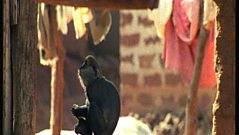
Treetop babysitters
Family life is the key to success for Madagascars ruffed lemurs.
Family life thrived in daylight and Charlotte Uhlenbroek is in Madagascar looking at ruffed lemur families. They can have as many as five babies at a time and they need lots of help from relatives to raise them, so teamwork is vital. The babies are rather helpless and have to be carried everywhere one at a time. Their mother takes the precaution of moving them several times a day because they are easy targets for birds of prey and snakes. It must be exhausting work but at least she has someone looking after the others in the meantime. Once they are all safely installed at the new site she goes off to have a well-earned meal, leaving her brood in the care of a nanny. But babysitting them is no easy job as the youngsters are eager to explore their new surroundings. Two out of three youngsters do not make it through their first year. It is a long way down and many are simply not very good at holding on. After four months, it is not surprising that some babysitters end up sleeping on the job. But the support of family life helps Madagascar’s lemurs to flourish and diversify.
Duration:
This clip is from
Featured in...
![]()
ÃÛÑ¿´«Ã½ Nature
Be captivated, informed and inspired by the world's wildlife.
More clips from FIRST PRIMATES
-
![]()
Arboreal ancestors
Duration: 02:32
-
![]()
Poison bath
Duration: 02:10
-
![]()
Pitched battle
Duration: 03:00
-
![]()
Millipede insecticide
Duration: 03:09
More clips from Cousins
-
![]()
A nose for swamp food—MONKEYS
Duration: 01:32
-
![]()
Food for thought—APES
Duration: 02:14
-
![]()
Free lunch—MONKEYS
Duration: 01:17
-
![]()
Arboreal ancestors—FIRST PRIMATES
Duration: 02:32









